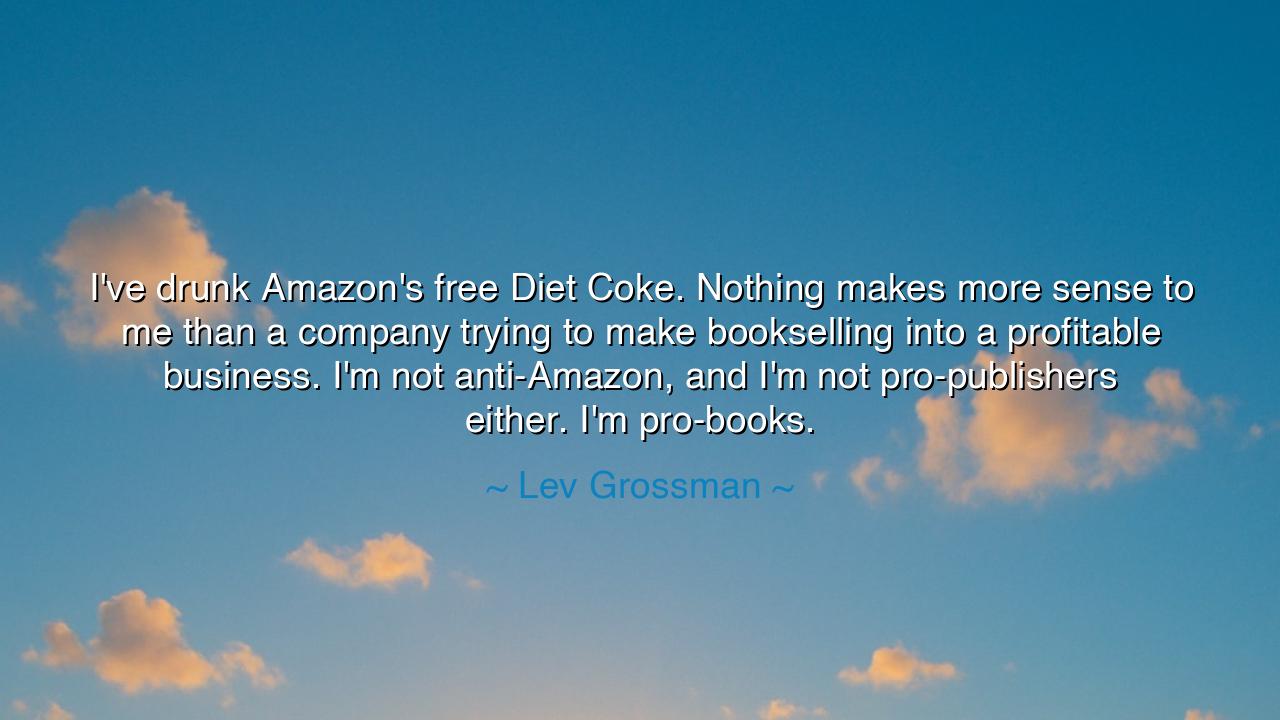
I've drunk Amazon's free Diet Coke. Nothing makes more sense to
I've drunk Amazon's free Diet Coke. Nothing makes more sense to me than a company trying to make bookselling into a profitable business. I'm not anti-Amazon, and I'm not pro-publishers either. I'm pro-books.






Listen, O children of wisdom, to the words of Lev Grossman, whose perspective on the modern world and the art of bookselling offers us a deep reflection on commerce, values, and what it means to truly support the written word: "I've drunk Amazon's free Diet Coke. Nothing makes more sense to me than a company trying to make bookselling into a profitable business. I'm not anti-Amazon, and I'm not pro-publishers either. I'm pro-books." In these words, Grossman cuts to the heart of a debate that stretches through the ages: the tension between commerce and the preservation of culture. He speaks not only of books and their sellers but of the larger dynamic that shapes our world—a world where the love of knowledge and culture must sometimes align with the realities of business and profit.
In the days of the ancient Greeks, Socrates was known for his love of knowledge and his disdain for materialism. He famously argued that true wisdom came from seeking knowledge for its own sake, not for profit or gain. Yet, even Socrates knew that the transmission of knowledge—the sacred duty of passing wisdom from one generation to the next—was not without its challenges. The ancient libraries, such as the legendary Library of Alexandria, were not just places of learning but institutions that required funding and support. Though the love of knowledge was paramount, Socrates and others understood that commerce and economics played a role in sustaining the institutions that carried that knowledge. Lev Grossman speaks to this delicate balance, recognizing that Amazon, for all its controversies, has made bookselling a business that can sustain itself in the modern world.
Consider the story of Alexander the Great, who, though a conqueror, understood the importance of learning and the preservation of knowledge. He carried with him not just armies, but scholars and philosophers, understanding that the true legacy of his empire would not lie solely in the lands he conquered, but in the knowledge that would be passed on. His empire became a melting pot of cultures, where ideas, philosophies, and books were exchanged and spread. Alexander didn’t view knowledge as something to be protected from the forces of commerce but as a force that needed the support of those who could maintain and expand it. Similarly, Grossman sees the value in companies like Amazon, who, for all their business practices, have made books available to a global audience, ensuring that knowledge is spread far and wide.
Yet, O children, even in Alexander’s time, the tension between profit and purpose was felt. The great libraries, while sacred places of learning, were also dependent on the wealth and power of those who funded them. In the modern age, this tension persists. Lev Grossman speaks with wisdom when he acknowledges that he is not necessarily anti-Amazon, nor is he an advocate for the publishers, but that his true allegiance lies with the books themselves. This is a reminder that knowledge is a living thing, meant to be shared and spread, even if it must be done through the hands of those whose primary aim is business.
The lesson, O children, is this: we must find a way to support the things we hold dear—whether it be books, knowledge, or culture—in a world that is shaped by commerce. We must not be blinded by an idealistic view that all things of value must be free from the constraints of business, nor should we be so focused on profit that we lose sight of the true purpose behind what is being sold. Just as Socrates did not reject the realities of the world but sought to engage with them in a way that served the pursuit of wisdom, so too must we navigate the world of modern commerce with an eye toward the true purpose of the things we value.
Grossman’s words challenge us to look beyond the surface and see that Amazon, though a massive company with its flaws, has enabled the spread of books to an extent that previous generations could not have imagined. The true test of our times, then, is not whether we support one company or another, but whether we support the books, the knowledge, and the culture that give meaning to our lives. Lev Grossman reminds us that, while we may debate the methods, the true value lies in the preservation and expansion of what makes us human: our ability to share, to learn, and to grow.
So, O children, let us take this wisdom and apply it to our own lives. Let us remember that books, like knowledge, are treasures that should be cherished and shared, regardless of the form in which they are delivered. Whether we buy from the local bookstore or order from the farthest reaches of the internet, let us always remain pro-books, pro-knowledge, and pro-culture. Let us remember that in the pursuit of wisdom, all hands are needed, even those that hold the tools of commerce. And in this, we will ensure that the flame of learning burns brightly for generations to come.






AAdministratorAdministrator
Welcome, honored guests. Please leave a comment, we will respond soon